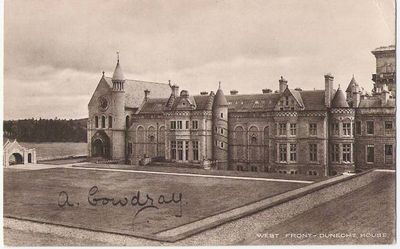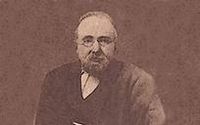Annotation:Countess of Crawford (The): Difference between revisions
No edit summary |
m (Text replacement - "garamond, serif" to "sans-serif") |
||
| (6 intermediate revisions by 2 users not shown) | |||
| Line 1: | Line 1: | ||
=='''Back to [[{{BASEPAGENAME}}]]'''== | =='''Back to [[{{BASEPAGENAME}}]]'''== | ||
---- | ---- | ||
<p><font face=" | <p><font face="sans-serif" size="4"> | ||
'''COUNTESS OF CRAWFORD, THE'''. AKA and see "[[Dunecht House]]." Scottish, Slow Strathspey or Air. A Major. Standard tuning (fiddle). AB. One of the most famous compositions of Peter Milne ( | '''COUNTESS OF CRAWFORD, THE'''. AKA and see "[[Dunecht House]]." Scottish, Slow Strathspey or Air. A Major. Standard tuning (fiddle). AB. One of the most famous compositions of Peter Milne (1824–1908), a Scottish fiddler, one of J. Scott Skinner's teachers and, later, fiddling partner. Milne was renowned for his ability to improvise numerous variation sets as he played. He managed to make a living playing theater venues all over Scotland, but became addicted to opium in the drug laudenaum, which he originally took as a pain-killer following an accident that left him debilitated. Milne ended his life in reduced circumstances, busking on the ferry which crossed the Firth of Forth until the Forth Bridge was built in 1908. He died in an insane asylum. The "Countess of Crawford" is considered to be among those of Milne's better compositions. See also Milne's companion reel, "[[Earl of Crawford (The)]]." | ||
<br> | |||
<br> | |||
[[File:dunnecht.jpg|400px|thumb|right|Dunnecht House]] | |||
Dunecht House is a mansion that was constructed in 1820 as the seat of Earl of Crawford and Balcarres. It features a grand ballroom, chapel and observatory and is surrounded by extensive gardens. The observatory was added by James Ludovic Lindsay (1847–1913), the 26th Earl of Crawford, a politician and amateur astronomer. | |||
<br> | <br> | ||
<br> | <br> | ||
</font></p> | </font></p> | ||
<p><font face=" | [[File:milne.jpg|200px|thumb|left|Peter Milne]] | ||
<p><font face="sans-serif" size="4"> | |||
''Source for notated version'': Arthur S. Robertson (Shetland) [Hunter]; Winston Fitzgerald (1914-1987, Cape Breton) [Cranford]; Hector MacAndrew [Martin]. | ''Source for notated version'': Arthur S. Robertson (Shetland) [Hunter]; Winston Fitzgerald (1914-1987, Cape Breton) [Cranford]; Hector MacAndrew [Martin]. | ||
<br> | <br> | ||
<br> | <br> | ||
</font></p> | </font></p> | ||
<p><font face=" | <p><font face="sans-serif" size="4"> | ||
''Printed sources'': Cranford ('''Winston Fitzgerald'''), 1997; No. 88, p. 38. Hunter ('''Fiddle Music of Scotland'''), 1988; No. 121. Martin ('''Traditional Scottish Fiddling'''), 2002; p. 138. | ''Printed sources'': | ||
Cranford ('''Winston Fitzgerald: A Collection of Fiddle Tunes'''), 1997; No. 88, p. 38. | |||
Hunter ('''Fiddle Music of Scotland'''), 1988; No. 121. | |||
Martin ('''Traditional Scottish Fiddling'''), 2002; p. 138. | |||
Milne ('''Middleton's Selection of Strathspeys, Reels, &c. for the Violin'''), c. 1882; p. 28. | |||
<br> | <br> | ||
<br> | <br> | ||
</font></p> | </font></p> | ||
<p><font face=" | <p><font face="sans-serif" size="4"> | ||
''Recorded sources'': <font color=teal>Olympic 6151, Arthur Robertson | ''Recorded sources'': | ||
<font color=teal> | |||
Olympic 6151, Arthur Robertson – "Scottish Traditional Fiddle Music" (1978). | |||
</font> | |||
</font></p> | </font></p> | ||
<br> | <br> | ||
<br> | <br style="clear:both"/> | ||
---- | ---- | ||
=='''Back to [[{{BASEPAGENAME}}]]'''== | =='''Back to [[{{BASEPAGENAME}}]]'''== | ||
Latest revision as of 13:10, 6 May 2019
Back to Countess of Crawford (The)
COUNTESS OF CRAWFORD, THE. AKA and see "Dunecht House." Scottish, Slow Strathspey or Air. A Major. Standard tuning (fiddle). AB. One of the most famous compositions of Peter Milne (1824–1908), a Scottish fiddler, one of J. Scott Skinner's teachers and, later, fiddling partner. Milne was renowned for his ability to improvise numerous variation sets as he played. He managed to make a living playing theater venues all over Scotland, but became addicted to opium in the drug laudenaum, which he originally took as a pain-killer following an accident that left him debilitated. Milne ended his life in reduced circumstances, busking on the ferry which crossed the Firth of Forth until the Forth Bridge was built in 1908. He died in an insane asylum. The "Countess of Crawford" is considered to be among those of Milne's better compositions. See also Milne's companion reel, "Earl of Crawford (The)."

Dunecht House is a mansion that was constructed in 1820 as the seat of Earl of Crawford and Balcarres. It features a grand ballroom, chapel and observatory and is surrounded by extensive gardens. The observatory was added by James Ludovic Lindsay (1847–1913), the 26th Earl of Crawford, a politician and amateur astronomer.

Source for notated version: Arthur S. Robertson (Shetland) [Hunter]; Winston Fitzgerald (1914-1987, Cape Breton) [Cranford]; Hector MacAndrew [Martin].
Printed sources:
Cranford (Winston Fitzgerald: A Collection of Fiddle Tunes), 1997; No. 88, p. 38.
Hunter (Fiddle Music of Scotland), 1988; No. 121.
Martin (Traditional Scottish Fiddling), 2002; p. 138.
Milne (Middleton's Selection of Strathspeys, Reels, &c. for the Violin), c. 1882; p. 28.
Recorded sources: Olympic 6151, Arthur Robertson – "Scottish Traditional Fiddle Music" (1978).
